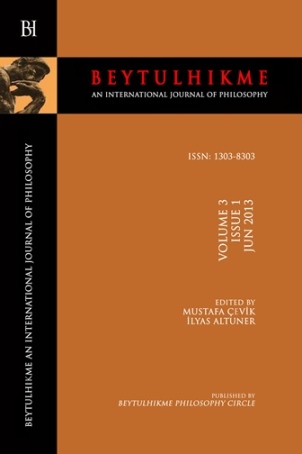Author :
Abstract
Özet: Hume çalışmalarında iki türlü ‘neden‘ kabul etmektedir. Bunlardan biri tek tek varlıkların nedenleridir. Diğeri de evrenin her yerinden çıkarabileceğimiz bir nedendir. Yaygın olarak bilindiği gibi nedensellik kuramına dair düşüncelerini ilk iki eseri olan Treatise of Human Nature ve Enquiry Concarning Human Understanding isimli çalışmasında şekillendirir. Fakat daha sonraki iki temel çalışması olan Natural History of religion ve Dialogues Concernin Natural Religion kitaplarında Hume evrenin nedeni hakkında tartışmalara yer verir. Bu çalışmada Hume’un bu ikinci tür ‘neden’ini bir tür ‘ilk neden’ olarak tanımlayabilip tanımlanamayacağımızı tartıştık. Öyle anlaşılıyor ki Hume “her şeyin ilk nedeni” kavramını salt epistemolojik anlamdan çok teolojik bir anlamda kullanmaktadır.<
Keywords
Abstract
Hume accepts and discusses two kinds of ‘causes’ in his writings. One of them causes is the particular cause. The other which Hume discusses is the cause that can be perceived in everywhere in the universe. As is commonly known, Hume constructs the theoretical foundation of ‘cause’ and ‘causality’ in his first two books, namely Treatise of Human Nature and Enquiry Concerning Human Understanding. But in his later books, especially in Dialogues Concerning Natural Religion and Natural History of Religion, Hume, discusses the cause of the universe. In this paper we will discuss whether can we define this second kind of cause ‘cause’ as the ‘first cause’ or not. It looks that Hume uses the expression “first cause of all” not only in epistemological sense but also to denote a theological meaning. <
Keywords
- Hume, D. (1947a). Dialogues Concerning Natural Religion (ed. N.K. Smith). London: Thomas Nelson & Sons.
- Hume, D. (1947b). My Own Life, in Dialogues Concerning Natural Religion (ed. N.K. Smith). London: Thomas Nelson & Sons.
- Hume, D. (1964). The Natural History of Religion, in Essays Moral, Political, and Literary (ed. T.H. Green & T.H. Grose). Vol. II. London.
- Hume, D. (1975). Enquiry Concerning Human Understanding and Concerning the Princi- ples of Morals (ed. L.A. Selby-Bigge). Oxford: Clarendon Press.
- Hume, D. (1978). Treatise of Human Nature (ed. L.A. Selby-Bigge). Oxford: Claren- don Press.
- Nathan, G. J. (1995). The Existence and Nature of God in Hume’s Theism. David Hume: Critical Assesments (ed. S. Tweyman). Vol. V. New York: Routledge. Özet: Özet: Hume çalışmalarında iki türlü ‘neden‘ kabul etmektedir. Bunlardan biri tek tek varlıkların nedenleridir. Diğeri de evrenin her yerinden çıkarabileceğimiz bir nedendir. Yaygın olarak bilindiği gibi nedensellik kuramına dair düşüncelerini ilk iki eseri olan Treatise of Human Nature ve Enquiry Concarning Human Understanding isimli çalışmasında şekillendirir. Fakat daha sonraki iki temel çalışması olan Natural History of religion ve Dialogues Concernin Natural Religion kitaplarında Hume evrenin nedeni hakkında tartışmalara yer verir. Bu çalışmada Hume’un bu ikinci tür ‘neden’ini bir tür ‘ilk neden’ olarak tanımlayabilip tanımlanamayacağımızı tartıştık. Öyle anlaşılıyor ki Hume “her şeyin ilk nedeni” kavramını salt epistemolojik anlamdan çok teolojik bir anlamda kullanmaktadır. Anahtar Kelimeler: Hume, teizm, ilk neden, Tanrı, doğal din.
